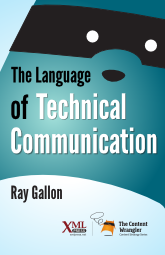
The Language of Technical Communication
edited by Ray Gallon.
$24.95 (print) $19.95 (Ebook).
Buy eBook bundle at the XML Press store
The Language of Technical Communication has a dual objective: to define the terms that form the core of technical communication as it is practiced today, while predicting where the field will go in the future. The choice of terms defined in this book followed two overarching principles: include all aspects of the discipline of technical communication, not just technical writing, and select terms that will be relevant into the foreseeable future.
Inside the Book
The Language of Technical Communication is a collaborative effort with fifty-two expert contributors, all known for their depth of knowledge. You will probably recognize many of their names, and you will probably want to learn more about the ones who are new to you. Each contributed term has a concise definition, an importance statement, and an essay that describes why technical communicators need to know that term.
You will find well understood terms, such as content reuse and minimalist design, alongside new terms, such as the Internet of Things and augmented reality. They span the depth and breadth, as well as the past and future, of technical communication.
Terms are grouped into five categories: Core Concepts, Technical Concepts, Standards and Conventions, Deliverable Presentations, and Future Directions.
About Ray Gallon
Ray Gallon is a writer, educator, and communication specialist. He is president and cofounder of the Transformation Society, which develops strategies for humanist digital transformation and organizational learning, and provides evaluation and research in fields of education, communication, and organizational development. His most recent work focuses on applications of Artificial Intelligence for personalized information delivery, personalized learning, and meta-analysis.
Ray is a fellow of the Society for Technical Communication (STC), and has served as an STC international board member, past president of STC France, and president of The Information 4.0 consortium. He is a frequent speaker and keynoter on communications, and on learning professions and organizations, at conferences and seminars around the world. He has contributed nearly 100 articles and chapters to books, and to professional and scholarly journals.
What are They Saying?
“Whether you are a newly hired trainee or a seasoned professional, understanding the body of terms in this book will help you be a more effective technical communicator.”
— Alan Houser, Group Wellesley, Inc.
“Compact, elegantly simple, and direct, with the overarching discipline of form provided by editor Ray Gallon, this book assembles much sought-after information in one place.”
— Natalia Lincoln, full review at tcworld.info (Tekom members only)
